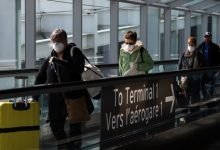Royal Military College classes, base training courses still on, despite COVID-19
Training courses at Canadian Armed Forces bases and classes at the country’s two principal military colleges will continue, despite the cascade of COVID-19 closures and public health warnings in the civilian world.
The major union of defence employees has questioned the wisdom of the Department of National Defence’s determination to keep the doors open — with online instruction — at the Royal Military College of Canada in Kingston, Ont., and the Royal Military College in St-Jean, Que.
“RMC remains open and continues operating to provide the necessary training to new candidates, with health protection measures in place,” department spokesperson Jessica Lamirande told CBC News.

The military offers a vast menu of small-scale professional, technical and leaderships courses for existing personnel at bases across the country as part of career advancement.
On Monday, some members at Canadian Forces Base Borden, Ont., were being told to prepare for one such course.
The Department of National Defence’s (DND) reluctance to suspend classes across the system stands in contrast to Prime Minister Justin Trudeau’s insistence Monday that “everyone go home and stay home” in order to slow the spread of the novel coronavirus enough to keep hospitals from becoming overwhelmed.
What’s ‘critical’ in a crisis?
The department’s stance has touched off a debate within DND and the wider federal government over what qualifies as a “critical function” in a national emergency.
The military has elected to cancel its major annual training exercise, known as Maple Resolve, and postpone other large scale manoeuvres — but the intense training courses remain operational in many cases.
The Union of National Defence Employees, with 14,000 members across the country, has received several complaints from workers at bases where training courses have not been suspended.
Lamirande insisted training is being limited to “essential core activities” within the military for the time being.
“Training at entry-level institutions such as the Royal Military College of Canada (RMC), which are core functions for the [Canadian Armed Forces], will continue to operate in order to minimize the long-term impact on our force strength and to our key defence functions,” Lamirande said, adding RMC graduates go to become junior officers.
In the view of the military’s leaders, it’s important for RMC cadets in particular to finish their academic year, and for those graduating to be prepared to serve, she added.
COVID-19 cases have not been reported on the campuses or the nearby base, which is closed to outside visitors.
There are still some in-person “engineering labs” taking place with the appropriate precautions, Lamirande said.
Professors whose discipline requires such in-person instruction have been told to limit contact with students. They and civilian support staff are being “encouraged to self-isolate while not on campus,” she said.
‘Members are scared’
Defence employees have asked why the courses cannot be suspended for the duration of the crisis.
“Members are scared, you know?” June Winger, president of the National Union of Defence Employees, told CBC News.
“On the one hand, they want to help Canadians. They want to be able to support the troops. They want to make sure everybody is safe. At the same time, they don’t want to be at-risk themselves.”
Winger has brought her concerns forward to senior officials at DND, who are standing by the decision to carry on.
“They feel the training is justified, it’s necessary to be able to maintain those critical functions, where in my humble opinion it’s not necessary at this time,” she said.
The federal Treasury Board has issued instructions on what it considers to be a “critical function” — but the Department of National Defence, given its national security role, has its own views on the subject. The department considers a function to be “critical” if it supports operations.
All of the commanders — army, navy, air force and special operations — were asked by senior leadership earlier this month to define, within their jurisdictions, what their core functions should be.
The answers varied depending upon the service, and even between one base and another. That has led to confusion among civilian staff, said Winger.
“They want to support Canada, support the military and then come home and be safe and sound with their families,” said Winger. “They’re finding it a struggle. And with the information they have, they are finding they have to choose.”
CBC








Redes Sociais - Comentários